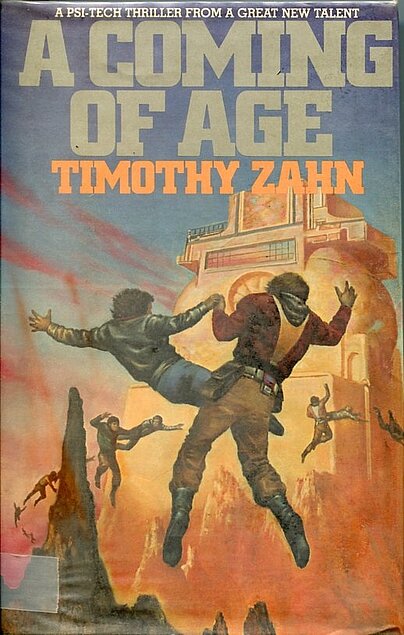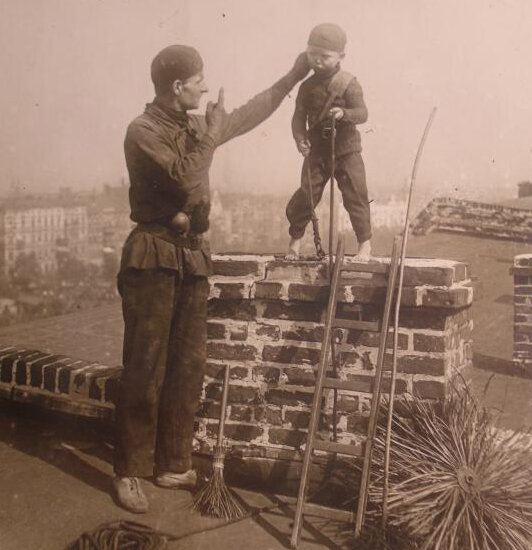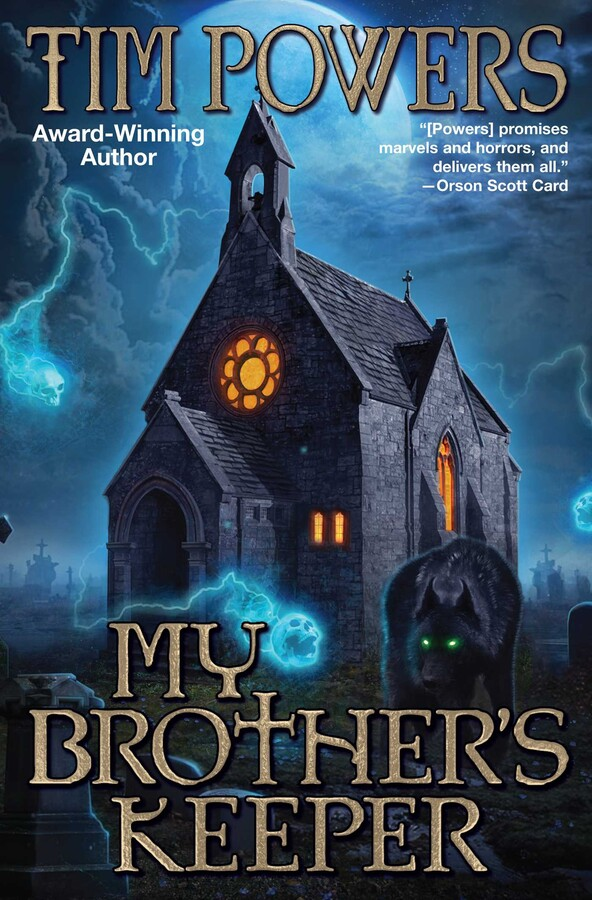A Coming of Age by Timothy Zahn
A Coming of Age by Timothy Zahn [Amazon link] is exactly the kind of thing Tim Zahn is good at writing: a whodunit with a science fiction milieu and a heavy dose of intrigue. Is is also further evidence that Zahn is the most consistent sci fi writer in the business, as it was published in 1984, and I honestly couldn’t tell. The man just keeps writing to the same standard, year in and year out. This was only his second published novel, but Zahn did have a couple of dozen short stories in print by then, which is less common now for an author just starting out.

A Coming of Age by Timothy Zahn Bluejay Books cover by Doug Beekman
I suppose one clue as to the age of the book might be the psychic powers: an idea that was pushed heavily by John Campbell and a frequent element of Campbelline era science fiction, but has since fallen out of fashion. On the world of Tigris, children develop telekinetic powers at around the age of five. Their strength continually grows as they do, with pre-teens capable of lifting thousands of pounds of weight at once, until it all abruptly comes crashing down on them at about puberty as their powers fade.
Zahn’s strength as a world-builder is in taking a world fundamentally like our own, changing one thing, and following the implications to a logical end. And in this case logic takes you to some pretty strange places. In this world, almost all heavy labor is done by children. Mining, construction, even power generation. All of that psychic power gets put to work.
Schooling, on the other hand, does not even begin until puberty hits, and the power fades. Partly this is because children are useful, and partly this is rooted in the bitter experience known as the Lost Generation that haunts Tigrin history. Since this is a whodunit, I won’t spoil exactly what that entails. The result of that cataclysm is that all children are taken from their parents around age five, and raised in the unsubtly named Hives.

A predilection for child labor isn’t the only thing that the world of Tigris shares with Georgian England. Power, ignorance, and naiveté make telekinetic children popular targets of scam artists and conmen know as Fagins, since copies of Oliver Twist [Amazon link] seem to have survived the Lost Generation. Small minded Fagins might content themselves with training children to be pickpockets and thieves, but whole new vistas in crime are available on Tigris.
This is an element that makes A Coming of Age seem more contemporary to me. Zahn’s description of the psychology of grooming is all too accurate. Today, when the McCarrick Report is freely available, and organizations like the Boy Scouts offer training courses on how to spot the manipulation of children, this knowledge is easier to come by now than it would have been in the 1980s.
Another bit done well is the technobabble surrounding the research of one of the characters on why telekinesis ends around puberty. I am close enough to the world of small-molecule hormone research to have heard this kind of thing myself, and while I’m far from an expert in the field and thus unable to offer any substantive assessment, Zahn did at least capture the feel of how researchers in this field tend to talk about their work, rather than assembling complex-sounding but otherwise nonsense words.
As the title tells us, this is not only a whodunit, but also a coming of age story. A girl on the cusp of womanhood faces the Transition, when she will lose her powers, move out the Hive in which she has grown up, and join the wider society. Anticipation, fear, and a terrible awkwardness are all on display as this fourteen year old comes to terms with what growing up means on Tigris..
It is relatively common for cultures to have sharply delineated worlds for children and adults, with a rite of passage marking the boundary between the two. Tigrin society, like ours, does not formally differentiate between genders, which makes some sense as telekinesis eliminates many of the physical differences. However, rites of passage are almost always strongly gendered when they do exist. I wonder whether Tigrin society mostly lacks a true rite of passage, as there are many hints it doesn’t go well.
However, we do not actually see the Transition in the text, only its shadow looming over everyone. Which is just as well, while it is a fun thing to speculate about, I’m not sure it would have made this book more interesting to see the event itself. The Transition impels many characters to act as they do, but everyone has a different relationship to it. For some, it is a looming deadline. For others, a distant and painful memory. It can be an opportunity, or a dragon to slay.
While there is a character who serves as the primary antagonist, in a sense the Transition itself is the real antagonist of the book, and the driver not just of these events, but all events in the history of Tigris after humans came to live there. Why not come along for the ride and see how Zahn crafts all that into a story?
My other book reviews | Reading Log
Other books by Timothy Zahn
New Thrawn series:
Thrawn
Thrawn: Alliances
Thrawn: Treason
Quadrail series:
Night Train to Rigel: Quadrail book 1 review
The Third Lynx: Quadrail book 2 review
Odd Girl Out: Quadrail book 3 review
The Domino Pattern: Quadrail book 4 review
Judgement at Proteus: Quadrail book 5 review
Original Thrawn Trilogy:
Heir to the Empire
Dark Force Rising
The Last Command
Blackcollar series:
The Blackcollar: Blackcollar series book 1 review
The Backlash Mission: Blackcollar series book 2 review
Dragonback series:
Dragon and Thief
Dragon and Soldier
Dragon and Slave
Dragon and Herdsman
Dragon and Judge
Dragon and Liberator



Comments ()